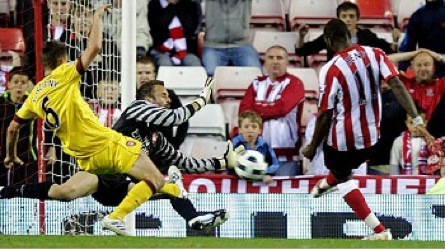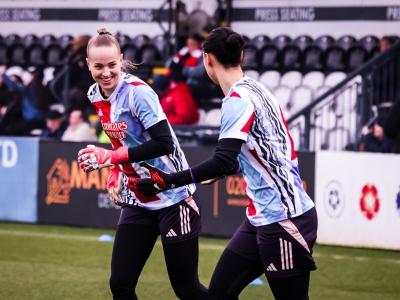My understanding of the rules regarding injury time is that when the fourth official holds up his board, the amount of time indicated is the minimum amount of minutes of injury time, and that if the ref feels there are four minutes and 30 seconds to add, then the board will say 4 minutes. Some referees do tend to blow on exactly the number of minutes they have indicated, but in reality if they are adding injury time exactly, there is only a one in 60 chance that the correct amount will be bang on the minute. So I don’t feel aggrieved that the Philip Dowd did not blow on the dot of four minutes. I have actually favoured basketball-style timing for several years now. The amount of time the ball is in play during a game is invariably around the 60 minute mark, so my feeling is that we should now have two halves of 30 minutes with the clock stopping every time the ball is dead. Then, when the half hour or hour mark passes, the next time the ball goes dead, we have half-time or full-time respectively. This would be a solution to timewasting at throw-ins, goal kicks and injuries. The exercise would become pointless.
As for the game itself, regardless of how late the goal was scored, Arsenal probably got a little more than they deserved. A win would have been fantastic, and the ability to gain three points when a team is playing badly is definitely the mark of champions in the making. My feeling is that a better defensive side would have seen injury time out without conceding, but Arsenal – although they tried manfully – did not defend well at the Stadium of Light. Only Sunderland’s poor finishing prevented them scoring at least three goals in normal time.
I think the kindest thing you can say is that Arsenal – until the 95th minute, weathered the storm, and credit to them for that. Sunderland though, for my money, were the better side for the majority of the game. Aside from the visitors’ centre backs and the keeper, only Chamakh and Nasri really had a decent game. Too many other players simply were not at the races. This is a problem that the side may face more than once this season with five of their Champions League group fixtures being followed by away games.
Fabregas’ goal was a reward for his persistence in closing down Anton Ferdinand, although it remains to be seen at what cost. Certainly his team could have used him for all of this game, as possession was given away a little more cheaply than one associates with an Arsenal side. Still, if it brought three points, it would have been an injury that I could have lived with easier. The opportunity to secure the win came with Tomas Rosicky’s second half penalty, after Alex Song’s dismissal had left his team a man short. I feel that, although his sending off may have been justified due to persistent fouling, there are many other players who would have played exactly the same and not even received a single yellow. Some consistency would be nice.
As for the penalty, it was a huge irony that Chris Waddle should be doing the analysis on this game for ESPN. Rosicky’s attempt probably joined the mullet-haired one’s ball from Turin 1990 in orbit. I received a text from Pete M shortly afterwards - Hope we don’t regret that. I didn’t have the will to respond, knowing that we probably would. Despite the poverty of their performance, going into injury time in the lead, the points dropped were cheap ones. Time will tell how critical they are. I suspect, given the injury problems the club habitually suffer, they will probably prove academic.
It’s swings and roundabouts really. Think back to Anfield and the time of Arsenal’s equalizer. Now the biter is bit. Arsenal spent a lot of this match under pressure and ultimately folded, not quite good enough to hold out. It’s a story we’ve seen a little too often in recent seasons, not least at Birmingham on two occasions that the club were in serious contention for the title. Folding late has become a habit, and it’s a hard habit to break.
Still, the team played poorly and got a point at Sunderland. The manner of it may seem like a defeat, but the manager is emphasizing the positives. He has no choice. The rest of us can rue the lack of authority and composure at the death, whilst watching Chelsea rack up the points.







